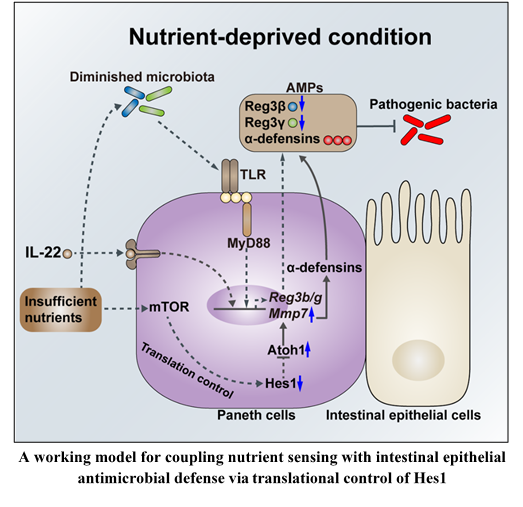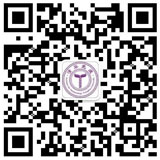On April 30, 2019, Dr. Xiaoyu Hu’s group at the Institute for Immunology, Tsinghua University published a research article entitled “Nutrient sensing by the intestinal epithelium orchestrates mucosal antimicrobial defense via translational control of Hes1” in Cell Host & Microbe. This article was selected for the cover of the journal’s May issue (Volume 25/Issue 5). This work demonstrates that during nutrient fluctuations, nutrient sensing mechanisms and antimicrobial responses are tightly coupled in intestinal epithelium via translational control of Hes1 to provide essential protection against enteric bacterial infections.

Metabolic programs and immune defense are among the most fundamental biological processes to ensure survival of individual organisms as well as successful propagation of a given species. Thus it is not surprising that metabolic programs and host defense are often integrated to ensure proper immune responses during stress. Central to these responses, mTOR regulates immune functions by sensing and integrating environmental cues, yet how these systems are coordinated at the intestinal surface remains undefined. This study shows that the antimicrobial peptide α-defensin is functionally sustained during nutrient deprivation due to regulation of defensin-processing enzyme MMP7 by microbiota- and host-derived factors. Unlike other antimicrobial peptides, the MMP7-α-defensin axis remains active during nutrient fluctuations, providing essential protection against enteric pathogens. Sustained Mmp7 expression requires the microbiota and is mediated by de-repression of the transcription activator Atoh1 upon attenuation of the transcriptional repressor Hes1 in intestinal epithelial cells. Hes1 levels are regulated via mTOR and controlled translationally, constituting a metabolism-translation-transcription loop. Disrupting this loop by supplying nutrients paradoxically compromises anti-bacterial defense. Together, these results uncover a regulatory circuit that couples host nutrient status to epithelial anti-microbial immunity, signifying the physiological importance of this previously unappreciated circuit in maintaining proper mucosal immune functions under various nutritional conditions.
Dr. Xiaoyu Hu is the corresponding author. A Ph.D. candidate Shaonan Liang and a postdoctoral fellow Dr. Xue-Kun Guo are the co-first authors of this study. Researchers from Dr. Chen Dong’s lab, Dr. Xuerui Yang’s lab and Dr. Wei Wu’s lab at Tsinghua University also contributed to this study. This study was supported by Ministry of Science and Technology of China (National Key Research Project), National Natural Science Foundation of China, funds from Tsinghua-Peking Center for Life Sciences, Institute for Immunology at Tsinghua University.
Link: https://www.cell.com/cell-host-microbe/fulltext/S1931-3128(19)30164-7

Copyright © 2017 Institute for Immunology Tsinghua University
Contact Address: Room D302, Medical Science Building, Tsinghua University, Beijing 100084, China
Tel: (86) 10-62776420 Fax: (86) 10-62776420
